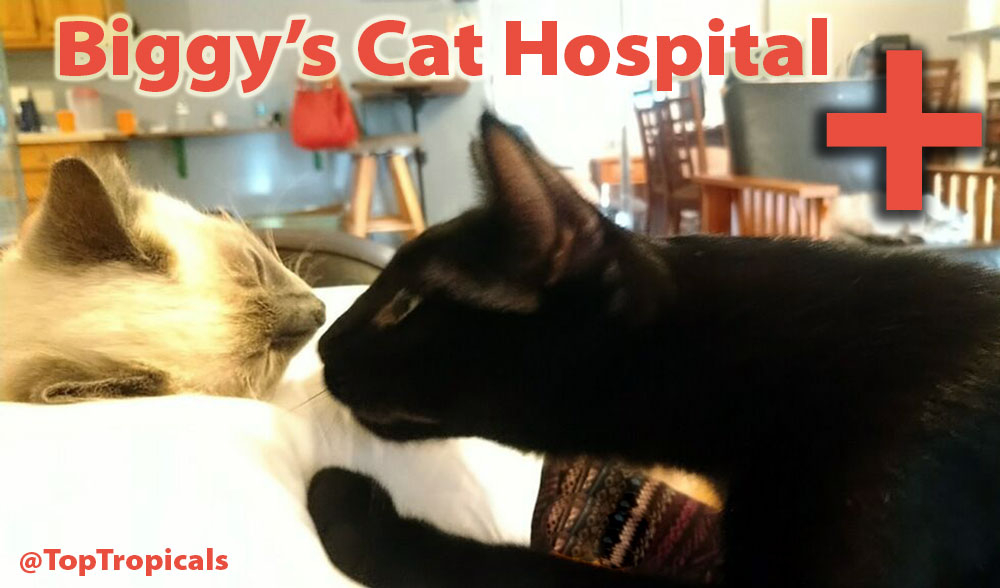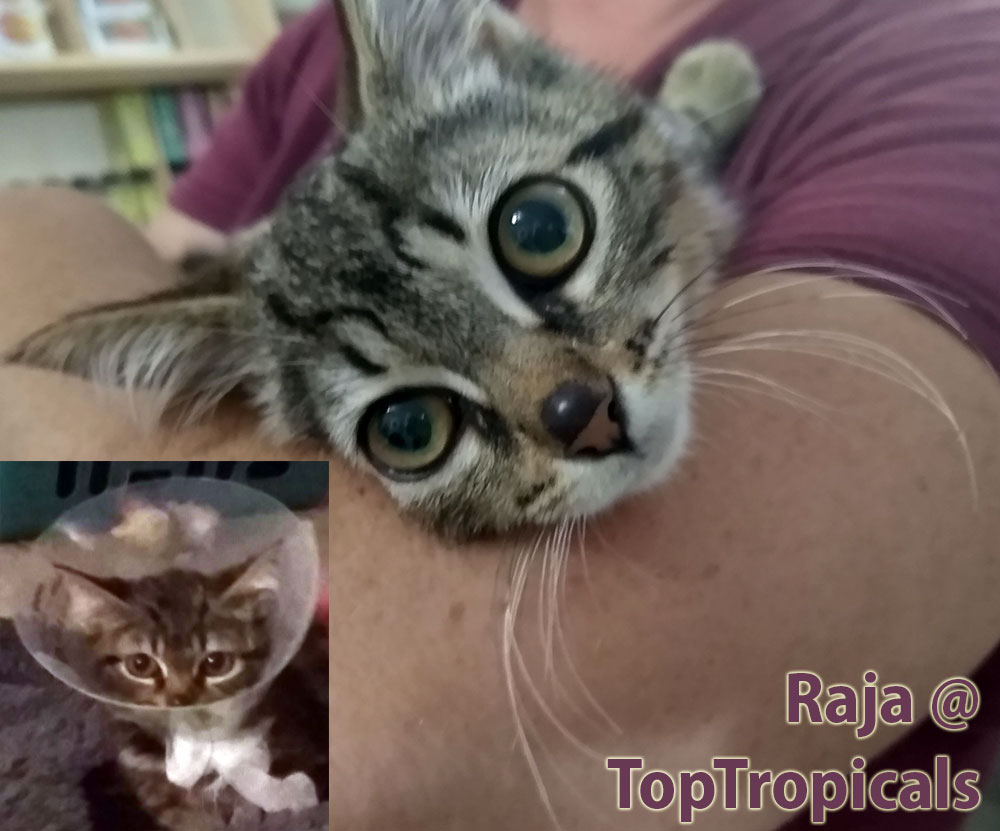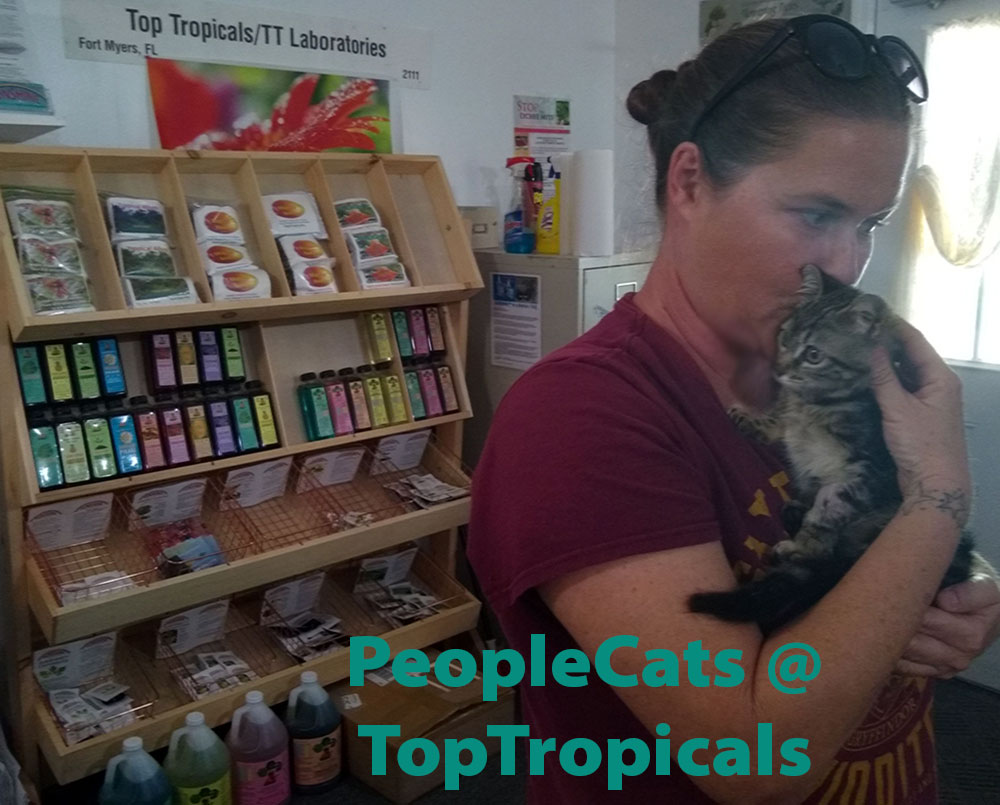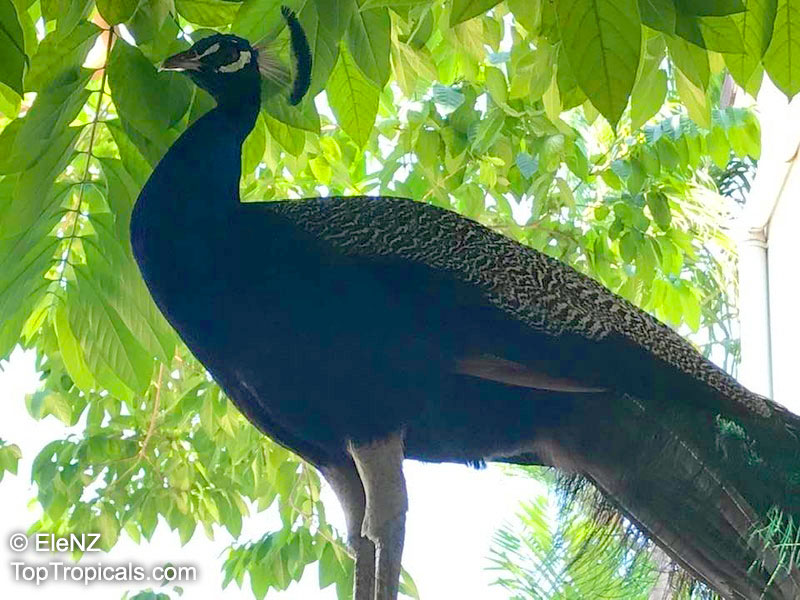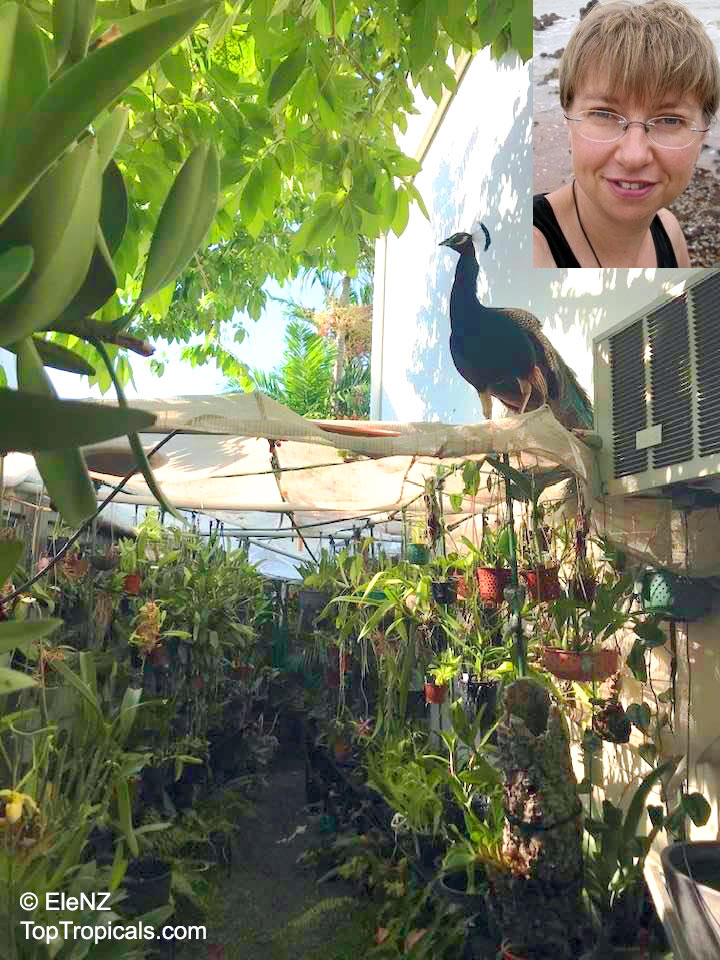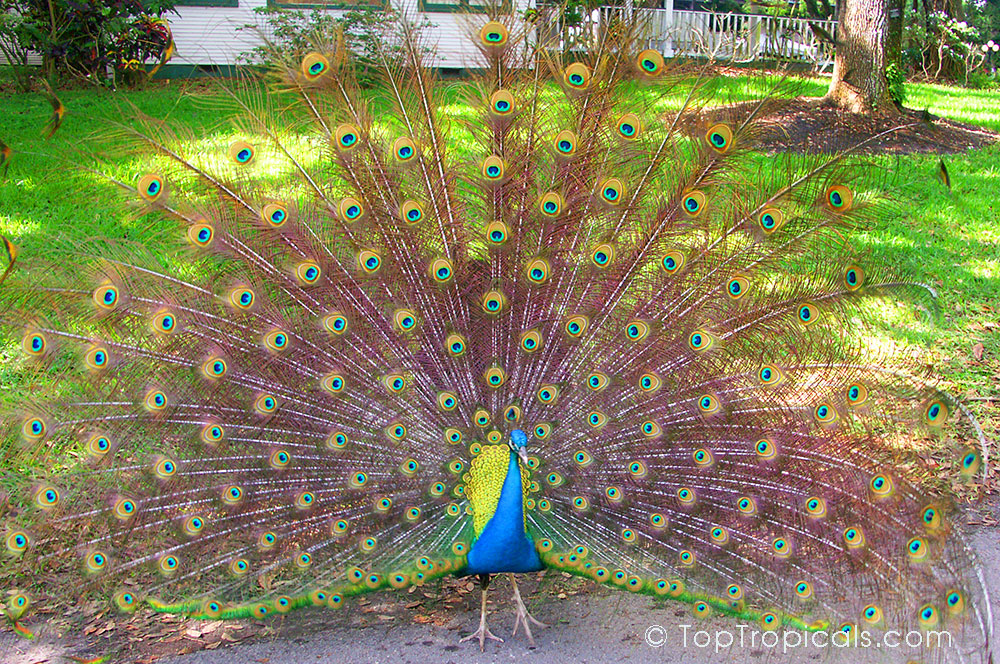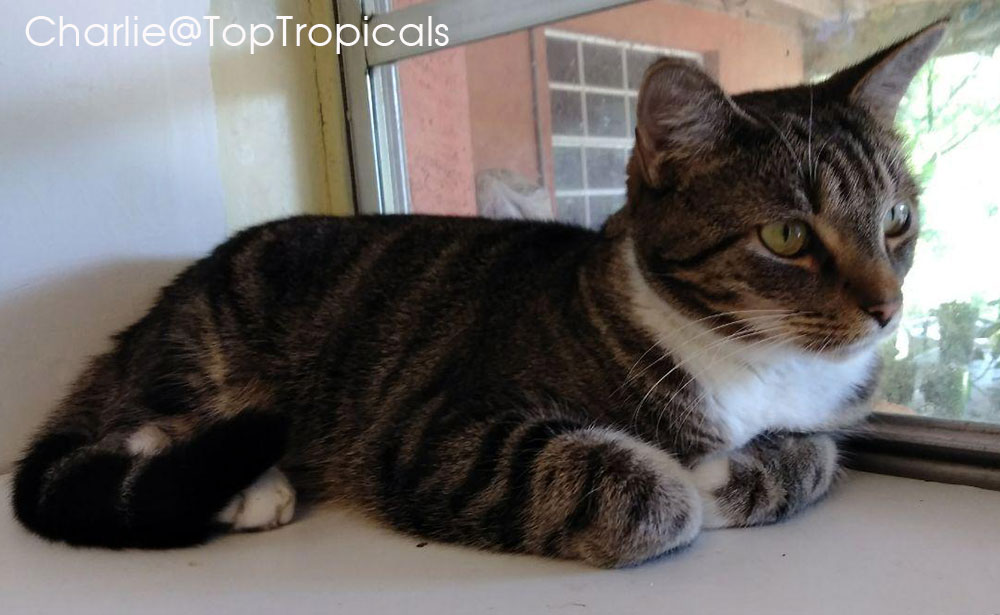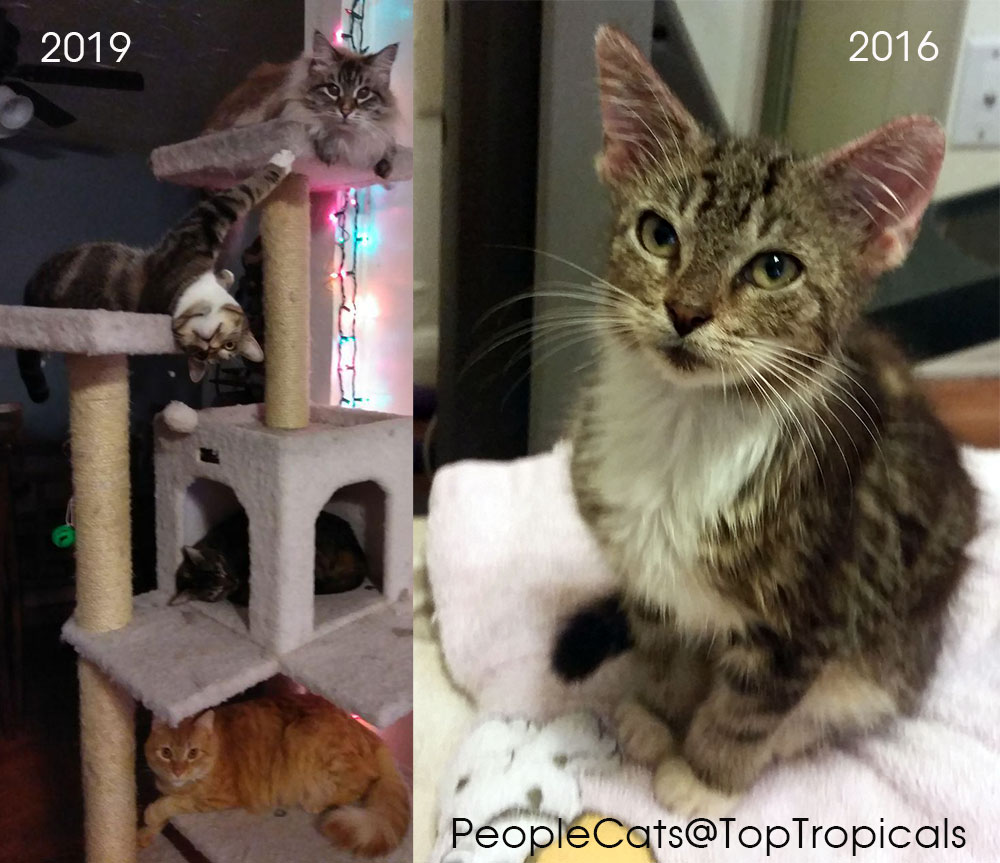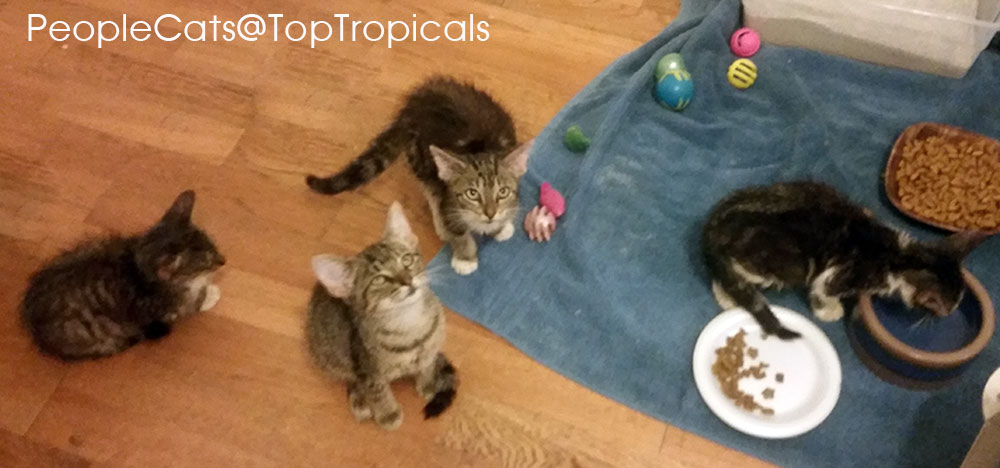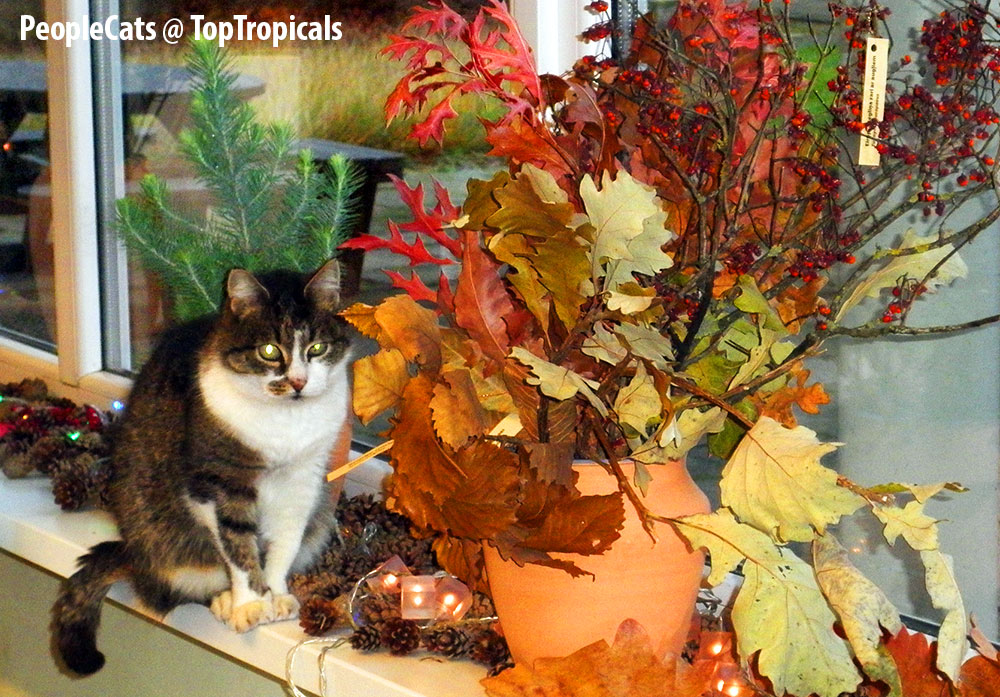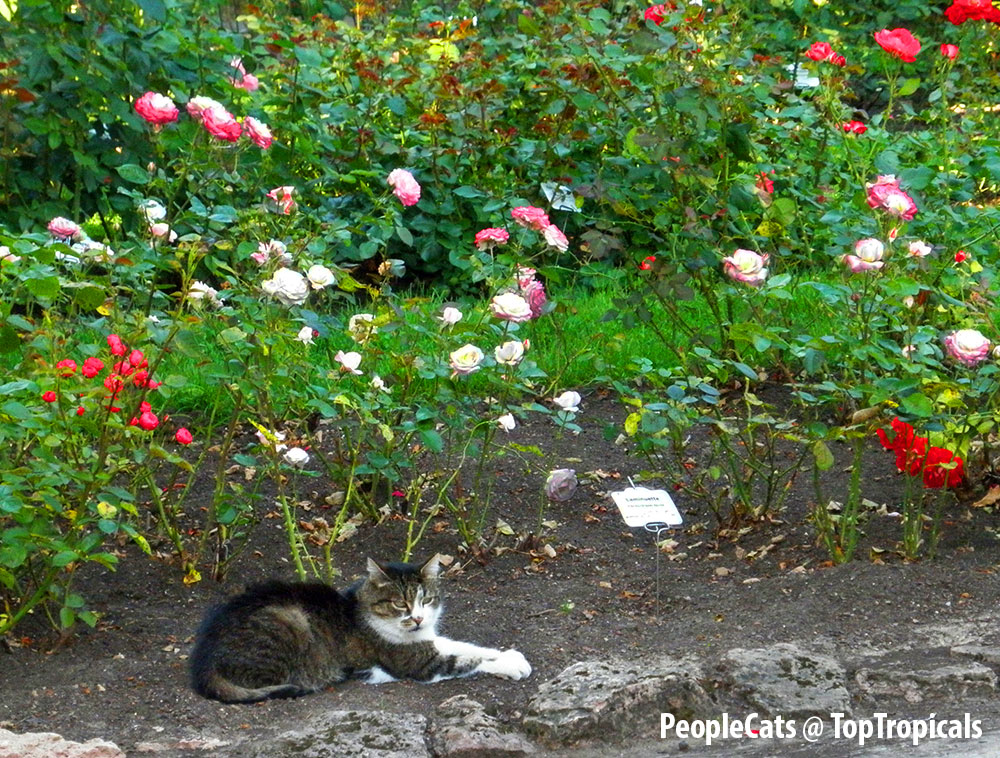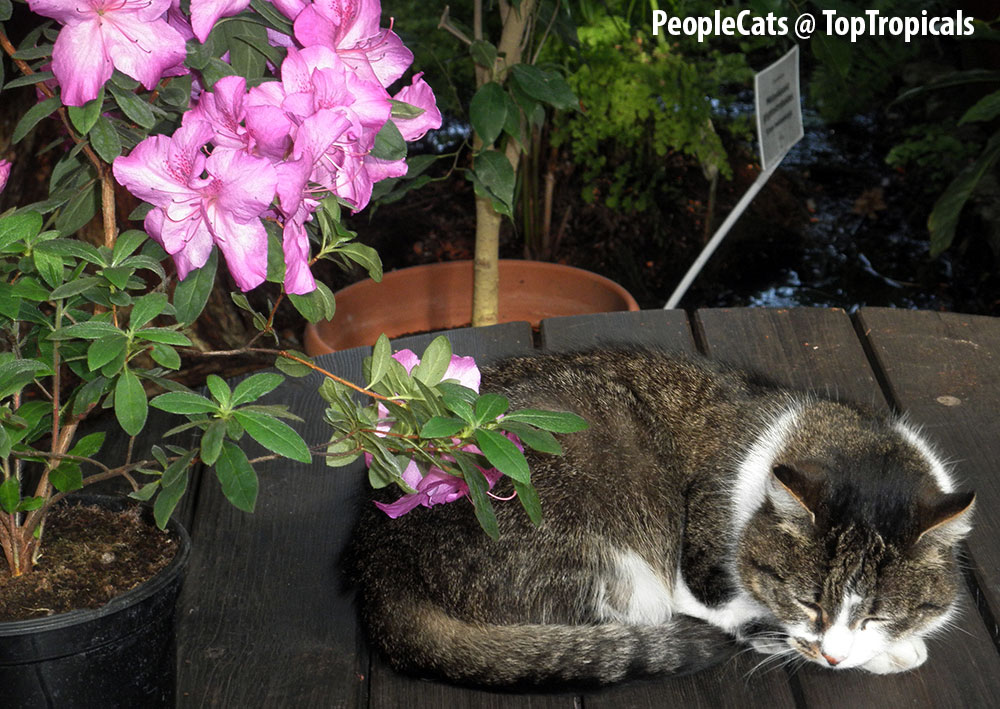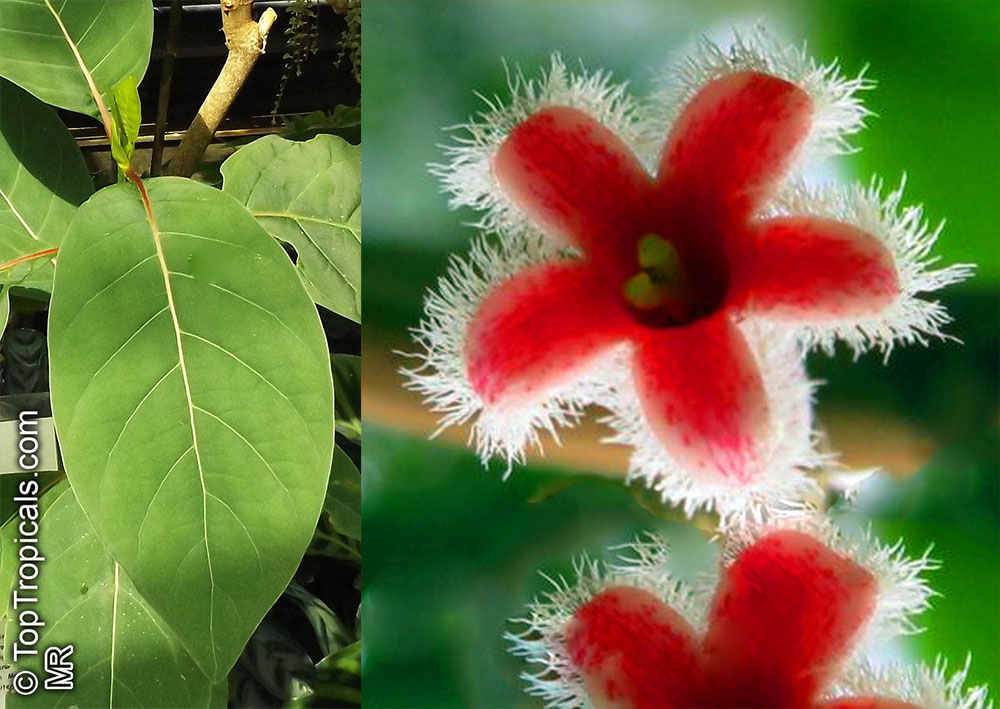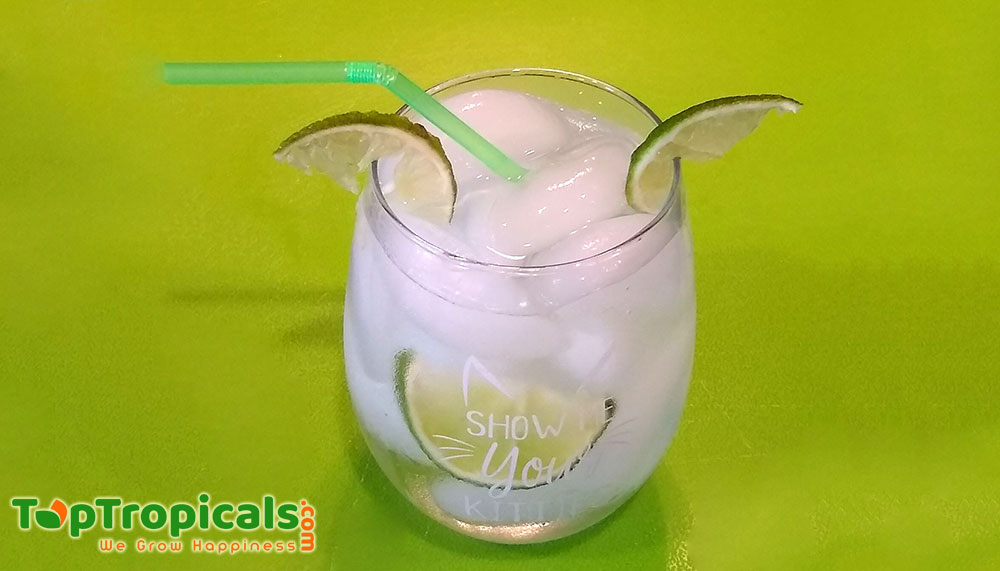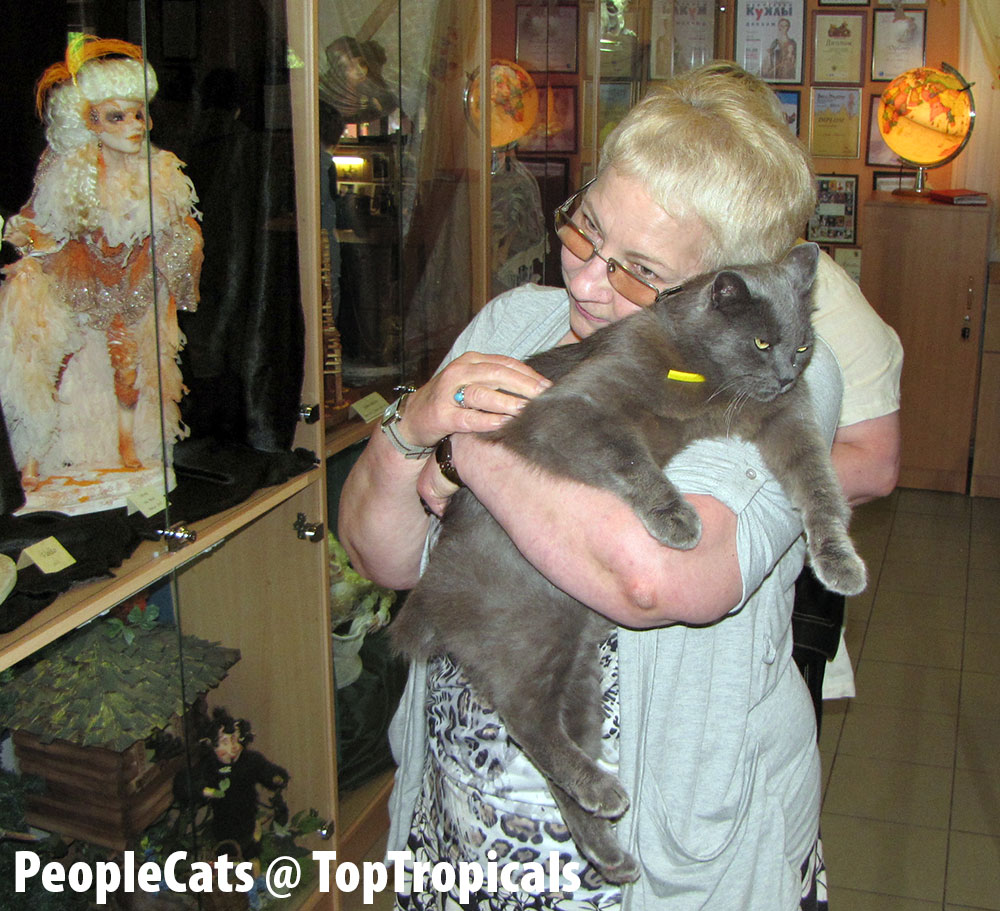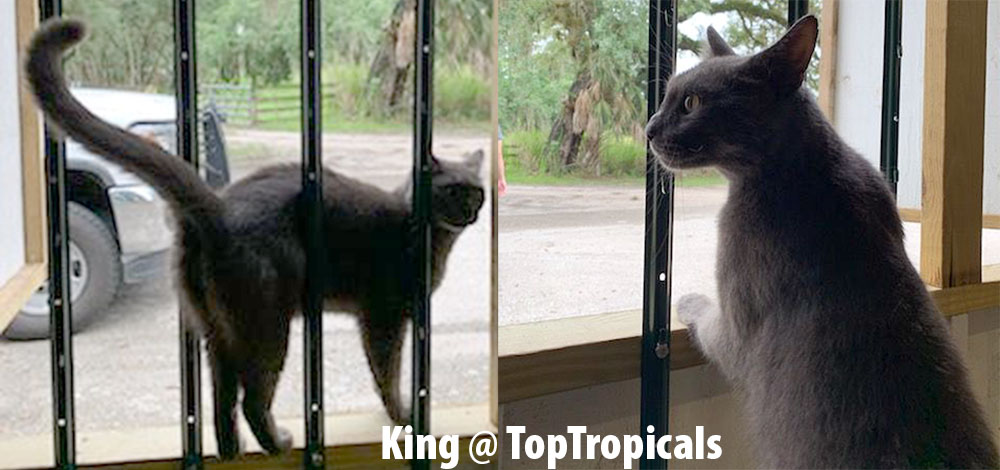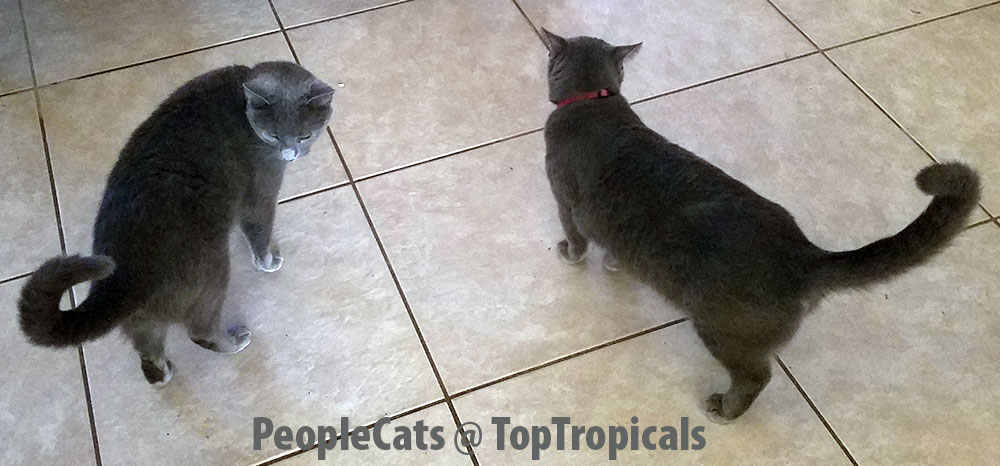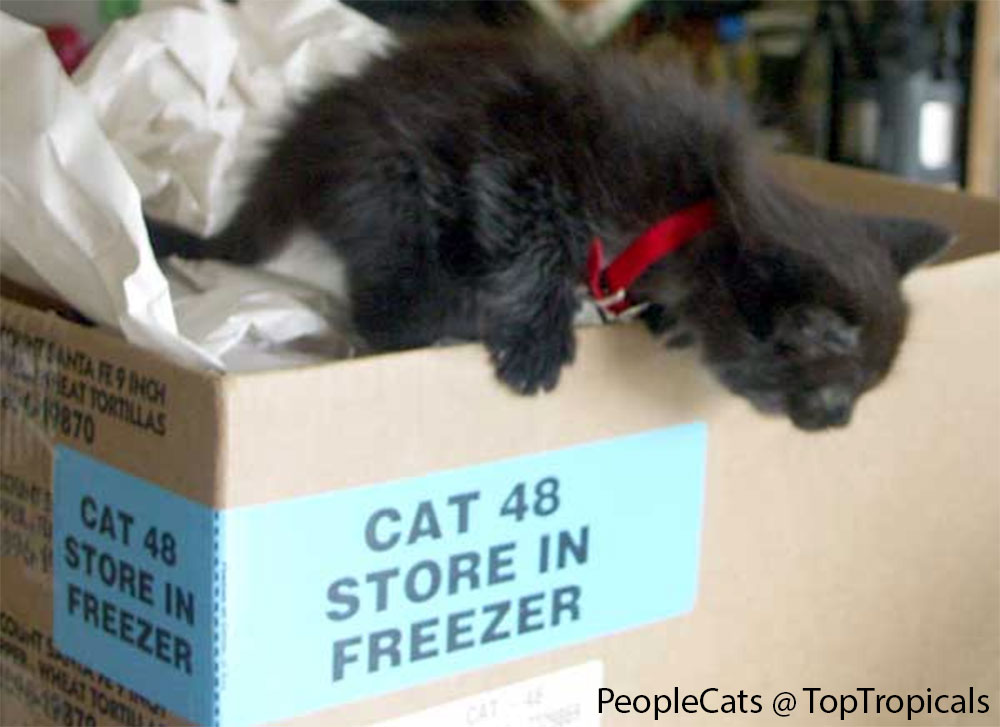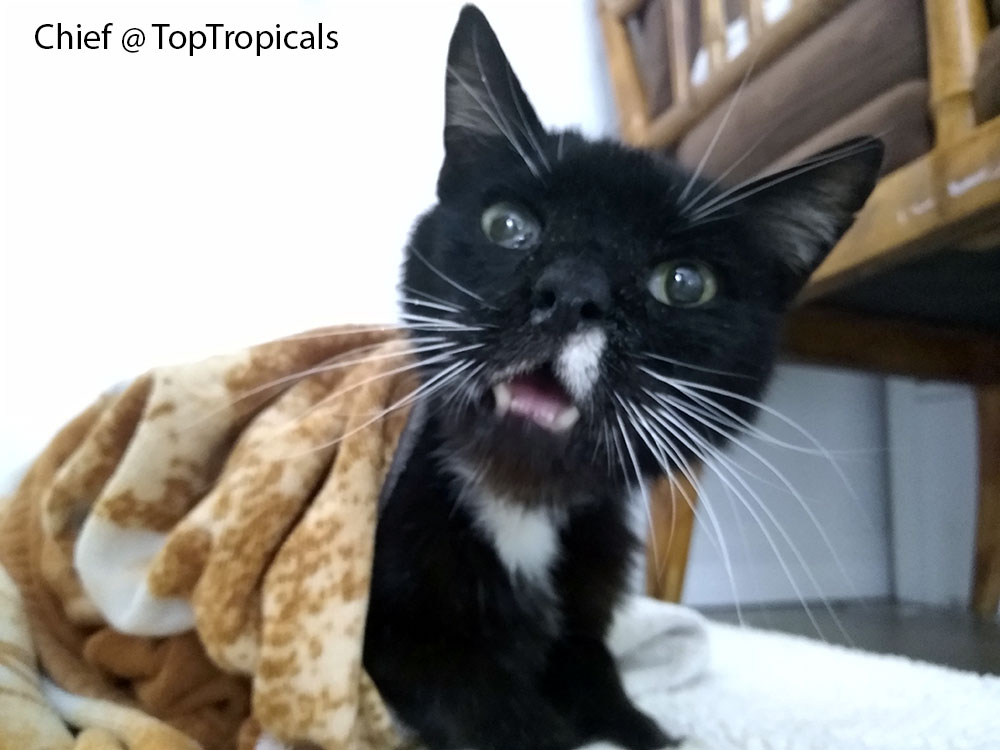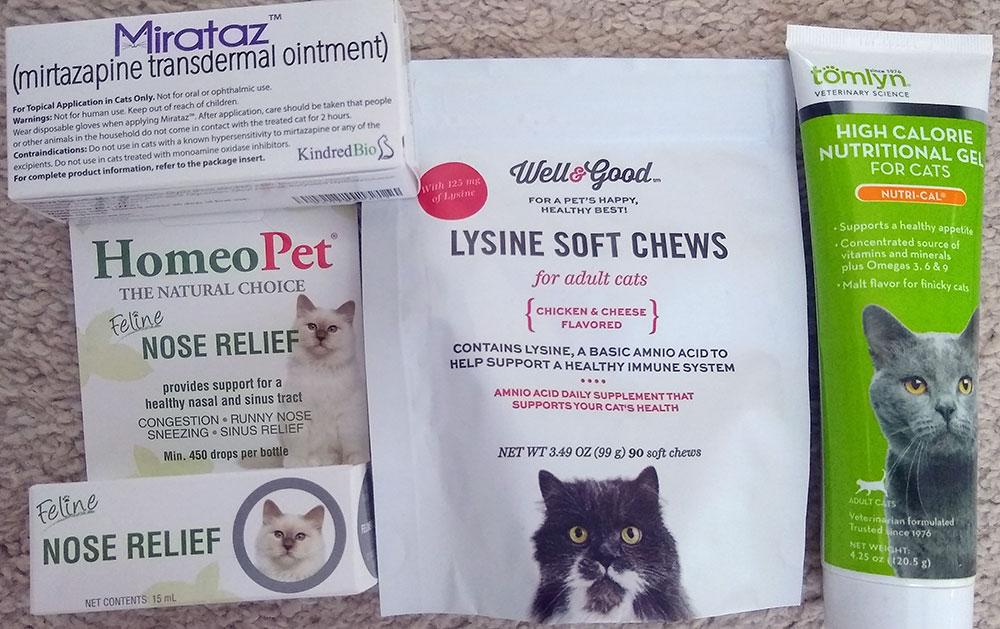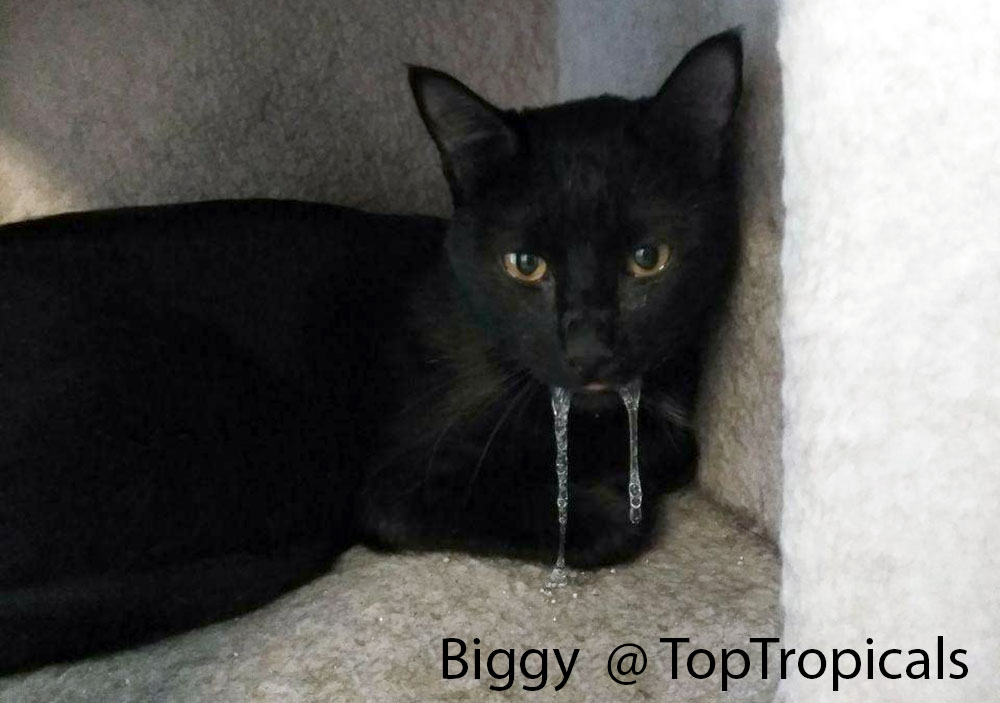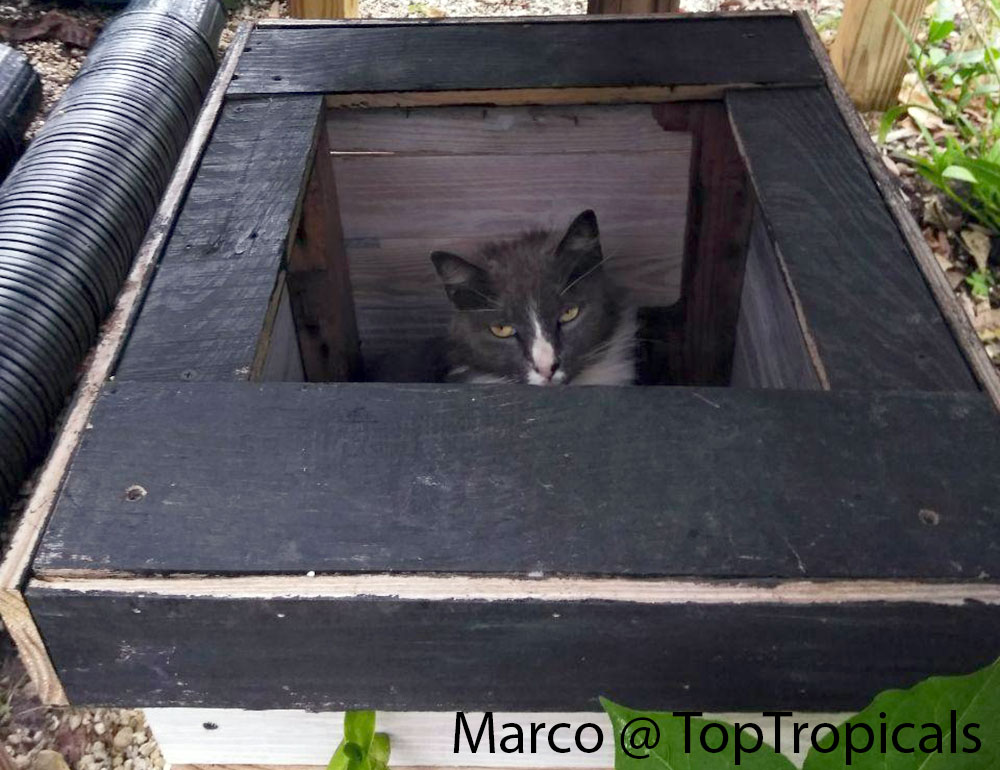Garden Blog - Top Tropicals
Date:
PeopleCats of TopTropicals. Cats of the day: Biggy's Cat Hospital
Biggy checking on patient Abu when he couldn't walk
During these challenging times for the whole planet, we receive kind letters from our customers checking on how our PeopleCats are doing, especially those that previously were ill. And since we promised to follow up on everyone, including heart-breaking story of Raja and Abu, today's report is about everybody's progress!
As we mentioned in our previous newsletter, several cats in TopTropicals
Cat Sanctuary had a coronavirus (we call it COVID-Cat-20), or simply a cat respiratory infection. Chiefy, Snitch, Marco and Biggy had it really bad, but some other PeopleCats surprisingly didn't
get it! Just like with humans. Lucky King didn't have a single sneeze!
Finally, everybody has recovered by now, but it has been a very stressful
couple of weeks for us, considering limited vet availability at this stay-home
time. On top of that, Lil S had an abscess and was also contained in a home hospital, away
from flu-quarantined PeopleCats. Our homes become real cat hospitals!
We are thankful to our customers support, especially Silvia who made
several donations for our PeopleCats, and also recommended antiseptic pads - those worked great for Lil S!
Abu and Raja's adventures were not over... After 2 weeks of seeing a
vet treating their infections and injuries, they got worse... Then after a
couple of weeks in another hospital (and a couple thousand more in bills) we were
suggested to put them down as hopeless since they would never walk again...
But Kristi did not want to believe it, she did not give up! The kittens heard
her. They won. Today, they are all better, walking, jumping and playing!
Thank you Kristi!
Never give up hope!
Stay safe and healthy with your PeoplePets!
TopTropicals PeopleCat Club
Thank you everybody for supporting us in helping PeopleCat Community!
Make
your kind donation today and receive a surprise gift from us. Every little
bit helps! Thank you and God bless you and your pets!
Date:
Meet People of TopTropicals. Pea Cock of the Day: the Orchid Guard
Recently we started to reveal the secret about who works behind the
scenes on TopTropicals project; you have already met our editors and their
assistants: Marina with Tilda, and Alex with Sonya. Today's story is about a Magic Peacock who works in orchid greenhouse of Eleanor
Wilks - our photographer and tropical plant journalist in New Zealand and
Australia. The watermark EleNZ you see on pictures of Australian flora - is
Eleanor's!
Today Eleanor is sharing with us pictures of this amazing bird that helps
her around her Orchidarium.
This young Pea Cock showed up one day in her backyard from nowhere and set
up his living quarters in a tree. She asked around: no one was missing a
peacock... so she took the Pea in and now he is in charge of her orchid
collection. After a day of a hard work, Pea comes home to the back porch, waiting for
Eleanor to sing him a good-night lullaby. Pea won't go to sleep until everyone in the house is ready for bed and the lights turned off. What a responsible house guard!
Check out and more Cat of the Day stories.
Date:
Meet PeopleCats of TopTropicals. Charlie, the Indoor Hunter
Carlie was a kitty drop off with LadyBug, Rickie, and Purry.
Charlie is Jamie's baby. She has an attitude of a teenager, one minute she
loves you and the next - wants nothing to do with you. Carlie stays with the
inside PeopleCats, she says it's too big in the outside world for her and she
gets scared. Carlie has a fun game (fun to her): she plays around 2:00 am in
the morning, she loves to drag random items down the hall (socks, toys,
shirts, even blankets) in her mouth MEOOOWWWING as loud as she can. She then sets
the items down on her human's bedroom rug and waits for her human to say
thank you. We're pretty sure her hunting instinct is off...
Check out and more Cat of the Day stories.
2019, from Top to Bottom: Moe, Charlie, Bagheera, and Snitch. 2016: Charlie
Date:
Meet PeopleCats of TopTropicals. Cat of the day: Ditta - the Botanical Cat
Ditta lives in Botanical Garden of
Riga, Latvia. Our columnist Alex Butova has been writing about that garden a lot and posted
numerous plant photos in our Catalog; now it is time to introduce its PeopleCats!
Ditta is the Boss of Riga Botanical Garden. She owns the security room and
watches her premises. Ditta is in charge of all events and exhibits of the
Garden, and her favorite spot is the Rose Garden.
TopTropicals PeopleCat Club and Zoo
Thank you for supporting us in helping PeopleCat Community!
Make
your kind donation today and receive a surprise gift from us! Every little
bit helps. Thank you and God bless you and your pets!
Date:
by Alex Butova
As the world's health experts race to find a cure for the novel
coronavirus, this drug have jumped to their attention - Chloroquine. It contains
alkaloid Quinine, extracted from the bark of the Cinchona, or Fever Tree.
We receive many questions from our customers if we carry this plant.
Although we do not offer it at the moment, we definitely can tell you more about
this interesting medicinal plant!
If you like gin and tonic, you will be familiar with the bitter taste of
the tonic which is provided by quinine. While it is now mainly used
to add a flavor to our favorite tipple, the Cinchona tree bark once held a
place as one of the most important drugs in history.
Cinchona was discovered in the 1630s as a treatment for malaria and, for
350 years, was the only effective cure known in Europe until synthetic
replacements were developed in the 1940s. Malaria remains today one of the deadliest
diseases known throughout the tropics, but up until the 20th century the
disease was prevalent throughout Europe, including Britain.
The Cinchona tree is native to the Eastern slopes of the Andes with a range across Ecuador, Peru and Bolivia. Once the bark became an established medicine, particularly in the 18th and 19th centuries, demand started to outstrip supply. Threats of overharvesting and the desire to control the source of this precious bark drove various competing empires to source this plant for themselves. Understandably, the Spanish, who were in control of this area of South America, actively tried to prevent this, but failed to establish successful plantations themselves. A race to source and cultivate Cinchona ensued, and eventually both the Dutch, in Indonesia, and the British, in India, founded government controlled plantations for the mass production of quinine.
Chloroquine appears to have "broad-spectrum antiviral properties" and effects on immune response, and to be effective against severe acute respiratory syndrome... As the rest of the world, we are looking forward to the research results and hope the cure will be found soon!
In the meantime, let's just have more Gin-n-Tonic!
Date:
Tu BiShvat - New Year for Trees
By Alex Butova
Tu BiShvat is the Israeli Arbor Day, and it is often referred to by that name in international media. Ecological organizations have adopted the holiday to further environmental-awareness programs. The modern practices and interpretations of Tu BiShvat often revolve around the earth and environment. This holiday is a celebration of nature and appreciation for creating the natural world. In Israel, Tu BiShvat is celebrated as an agricultural holiday. The 15th of Tu BiShvat was celebrated this year on February 10, 2020. This day marked the beginning of a new year for trees. This day marks the season in which the earliest-blooming trees emerge from their winter sleep and begin a new fruit-bearing cycle. Often the date of Tu BiShvat is used for determining the age of fruit baring trees and therefore establishes their birth dates. Therefore, Tu BiShvat is the "birthday" of trees!
The traditions and customs of Tu BiShvat vary, however, the most common include planting trees and gathering with family and friends for a meal. It is celebrated by eating fruit, particularly the kinds that praise the bounty of the Holy Land: grapes, figs, pomegranates, almonds, dates, olives and others. It reminds people that "a man is a tree of the field", and reflects on the lessons we can derive from the botanical analogue.
Check out fruit trees and nuts:
Persimmon tree
Loquat tree
Date:
Ghost Cold Protection
Q: Has anyone ever tried using heat packs under frost blankets to protect tropical plants from frost?
A: The reality is, the heat packs used for shipping do not have enough heat capacity to create efficient warming effect. From our own experience, the best way is to use small 25W incandescent bulbs which produce lots of heat (considering observing all safety precautions and fire safety). Some gardeners use Christmas lights. See picture of our plants in the ground during a cold night. We called them Ghost Cold Protection! ;)
See more columns on cold protection:
Seven rules of cold protection for tropicals
About Cold Protection
Cold protection - winter action for your plant collection
Tropical Treasures articles
Date:
Seven rules of cold protection for tropicals
Q: I was always wondering how you guys manage to grow true tropical trees in Florida? I live in Puerto Rico and we have Breadfruit trees growing here in a wild... but my sister lives not far away from you, in Orlando, which is much colder, and I wonder if I can get her a Breadfruit tree for Christmas?
A: Your
sister can grow a Breadfruit tree in Orlando either in a pot (and bring it indoors during
cold periods) or in the ground inside a structure (an elclosed conservatory
with heating system). See our customer's Greenhouse in Virginia. Cold protection of tropical plants is a lengthy
subject and we have many interesting publications about it in our managine
Tropical
Treasures and on the website. In a nutshell, when growing tropicals outside of
tropical climate, you need to follow these 7 rules:
1. Cut watering to a minimum. Cold+wet kills tropical roots.
2. Water thirsty plants before a cold night. Jucy leaves have fewer
chances to be cold-zapped.
3. Wind protection is more important than a temperature drop. Plant
tropicals close to a house or surrounded by other trees.
4. Duration of a cold period is more critical than the cold itself. If
expecting long cold hours, bring up all available protection resources.
Christmas lights or propane heaters - as long as there is a heat source,
everything helps!
5. Remove plastic covers during the daytime so plants don't get
"cooked" in the sun. Fabric covers are better than plastic.
6. Grow ultra-tropicals in containers and bring them inside the garage
or even indoors during the cold.
7. Use SUNSHINE plant boosters and feed your plants well during Summer to improve cold hardiness.
Related topics:
About Cold Protection
Cold protection - winter action for your plant collection
Improving cold hardiness before winter: fertilizer and micro-elements
Cold hardy tropical fruit trees
Date:
Meet PeopleCats of TopTropicals. Cat of the day: Russian Blue - a true Angel
Many customers ask if they can adopt one of our PeopleCats. Sorry, the answers is no, because they are not only members
of our family, but also valuable employees who help us around the nursery:
to grow and ship plants, work on construction projects, and even take care of
property security. However, we can give some advise on what kind of cats make
the most purrrfect companions.
If you are searching for a pet with a heart of an Angel, who is gentle and
loving, the Russian Blue is the perfect purrson to add to your family. The
Russian Blue breed comes in beautiful shades of gray, varying from a light
shimmering silver to a darker, slate gray. Their short, dense coat has been the
hallmark of the Russian breed for more than a century. It is a naturally
occurring breed originated in the port of Arkhangelsk in Russia. They are also
sometimes called ArchAngel Blues. It is believed that sailors took Russian Blues
from the Archangel Isles to Great Britain and Northern Europe in the
1860s.
Throughout the history of Top Tropicals, we've had many Russian Blues,
including famous Wesley, Marco, and King that are loved by everyone.
In the photo: TopTropicals editor Alex with Gosha - manager of the Puppet Kingdom, Museum of Dolls in Preili, Latvia
In the photo: King is checking security of the new window
TopTropicals PeopleCat Club and Zoo
Thank you for supporting us in helping PeopleCat Community!
Make
your kind donation today and receive a surprise gift from us! Every little
bit helps. Thank you and God bless you and your pets!
Date:
PeopleCats amid COVID-Cat-20
- Mark Twain -
While the whole world is suffering the virus attack, cats are no
exception. They do not get COVID-19, but they have their own coronavirus - a
respiratory condition that may become very dangerous for them. And although cat
coronavirus does not affect humans, we can transfer it to other cats
through our hands/petting, shared bowls and bedding, etc.
At TopTropicals, we had several cats sick with the flu and it took us a
long time and long hospital bills to bring them back to health! Below we are
sharing with you a few tips from our own experience that may help you fight and
treat cat coronavirus, that we call "Covid-Cat-20".
How to treat Cat Coronavirus
When cats get a flu/virus/cold, they suffer congestion, sneeze and cough. Just like us humans. But for cats, stuffed nose is much worse trouble, because they can't smell food = they won't eat it! In tough cases, they won't even drink any water. Due to specifics of cat metabolism, if a cat doesn't eat and/or drink for more than a couple of days, it may become life-threatening. It is not the virus that kills a cat, it is dehydration, lack of nutrition, and possible secondary infections.
- Vet. During Covid-19 lockdown, many animal hospitals are
closed, but if you are lucky to find a vet, it is wise to give the cat a
long-lasting shot of antibiotic. You can't treat a virus with antibiotic, but it will
prevent secondary infections (like pneumonia, etc.)
- Water is absolutely essential! Make sure your Cat drinks water. If
he (she) doesn't want to drink on his own, you need to give him water with a
syringe. As often as you can. Little by little. Or, ask a vet to put a
"water pouch" under cat's skin. This will save the cat from dehydration.
- Food is the main key! Your cat must eat a normal size portion per
day in order to fight the illness. Because he can't smell, it's possible he
won't eat on his own. Offer him a smelly, soft/wet food of room temperature or
slightly warmer: usually tuna works well. Get Salmon Oil and put on top of the food: it is smelly, plus a great
vitamin supplement.
- Hand-feeding. If congestion is bad, even a smelly tuna may not
help. Mix a spoonful of pate with some water and try to hand-feed this "soup" to
the cat either using syringe, or a small spoon. Little by little. Remember,
his nose is stuffed and he can't swallow and breath at the same time, so it
must be tiny bites. (Wrap the entire cat tightly in a large thick towel to
save yourself lots of scratching damage, leaving out just the face. Guaranteed,
he won't like the procedure and you will be surprised how strong he is for a
sick cat.)
- Supplements. For an extra nutrition support, you may use Critical nutrition food and other protein supplements. Consult your vet
and you may want to try the following aids: High Calorie Liquid or Gel
(easier to administer), HomeoPet Nose Relief (for de-congestion), Lysine
Soft Chews, and Mirataz ointment (to promote appetite).
- Rest. Keep the cat indoors, in a warm place, away from drafts.
Cover with a towel to make comfy. Keep lights dimmed. Change bedding, towels,
blankets at least daily to keep clean, get rid of germs and drooling
accidents.
- Quarantine from other cats, the cat coronavirus is super
catchy! Find that spare room. Bleach, soap, alcohol and Hand Sanitizer - are your friends now to maintain germ- and virus-free
environment.
- Mild cases. Some cats have mild symptoms (we've noticed that black
cats and tuxedo cats are more susceptible regardless of age). In this case,
do not panic - just give them time to recover. Lots of rest, privacy, and be
sure to monitor water/food intake!
- Tough cases. Most cats look lethargic when sick. At some point, if
within 3-4 days you don't see improvement and the coughing continues, you
need x-ray to rule out pneumonia.
Stay well and healthy, PeopleCats!
TopTropicals PeopleCat Club
Thank you everybody for supporting us in helping PeopleCat Community!
Make
your kind donation today and receive a surprise gift from us. Every little
bit helps! Thank you and God bless you and your pets!
